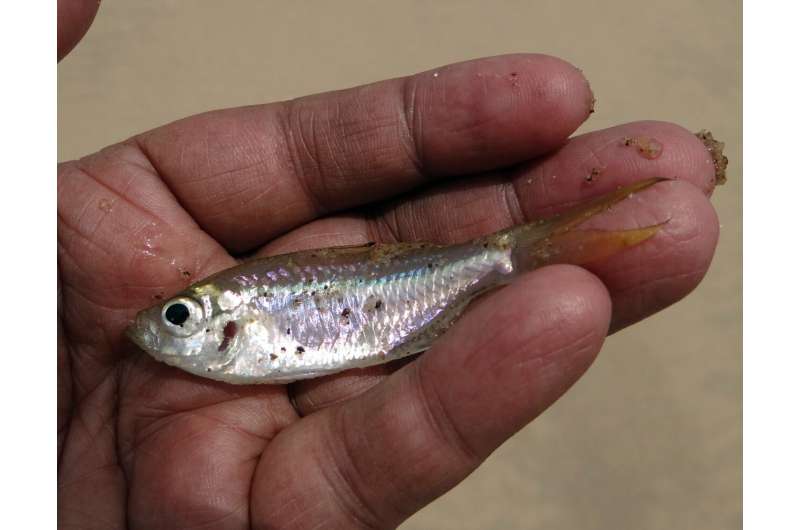Study suggests humble minnow can take the heat

Humans aren’t the only ones suffering through unprecedented heatwaves in a warming climate. Consider the humble minnow. These tiny fish represent the all-important base of the food chain in many freshwater ecosystems. And like all fish, minnows adjust their body temperature to match their surroundings. As climate change turns up the heat, could minnows cook?
A new University of Illinois study shows the fathead minnow, a ubiquitous prey fish in North American streams, can handle simulated heatwaves with surprisingly few nasty side effects.
“Fathead minnows are really common throughout North America and they’re important prey for a lot of charismatic sport fish anglers care about. So, learning how they handle heatwaves in this study gives us good insights into the potential fate of freshwater food webs under climate change,” says Cory Suski, professor in the Department of Natural Resources and Environmental Sciences at U of I and co-author on the study.
Suski says few researchers focus on the effects of heatwaves specifically. Instead, they may model an organism’s heat tolerance at 2 or 3 degrees Celsius above current average temperatures, the expected long-term rise under some climate scenarios. But it’s the short-term temperature spikes—5 to 10 degrees above average—that really test a creature’s physiological fortitude.
Doctoral student Qihong Dai used temperatures he recorded in agricultural streams during normal summer temperatures and heatwaves to test minnows’ physiological responses in the lab. He let the fish acclimate to laboratory tanks at 25 degrees before rapidly increasing the water temperature to 32 or 34 degrees. After an hour, he brought the temperature back to 25 degrees.
When simulating a single, short-duration heatwave, he left it at that. But Dai also simulated repeated heatwaves—an hour at 32 or 34 degrees three days in a row—and extended heatwaves, where water temperature remained high for 48 hours.
“After our simulated heatwaves, we tested enzymes reflecting the minnows’ ability to perform aerobic and anaerobic activities. We also were able to test changes in their metabolic rates during heatwaves,” Dai says. “After all three heatwave simulations, most minnows rapidly returned to normal physiological functioning when we cooled the water back down.”
The researchers also tested the minnows’ “critical thermal maximum” after each heatwave simulation and compared them to fish not exposed to heatwaves. In these tests, fish are subjected to slowly rising temperatures until they start acting a bit “woozy and wobbly,” in Suski’s words. Then they’re transferred safely back to cooler temperatures where they regain normal function.
Surprisingly, exposure to heatwaves actually primed minnows to withstand higher temperatures in the critical thermal maximum test. But that came at a cost for some fish.
“The heatwave didn’t impair their ability to swim or go about their business. In fact, they could handle higher temperatures after the heatwaves, but some became more susceptible to oxidative stress. That could lead to long-term tissue degradation from free radical damage and other physiological problems,” Suski says.
Despite the cost, most minnows seemed to come out stronger on the other side of the simulated heatwaves, at least in the short term.
“We are surprised but also excited to see how minnows can be so resilient to heatwaves in the Midwest,” Dai says.
The study is published in Freshwater Biology.
New study explores the prevalence of heatwaves in East Asia
Qihong Dai et al, Thermal tolerance of fish to heatwaves in agricultural streams: What does not kill you makes you stronger?, Freshwater Biology (2022). DOI: 10.1111/fwb.13976
Citation:
Study suggests humble minnow can take the heat (2022, August 22)
retrieved 22 August 2022
from https://phys.org/news/2022-08-humble-minnow.html
This document is subject to copyright. Apart from any fair dealing for the purpose of private study or research, no
part may be reproduced without the written permission. The content is provided for information purposes only.
For all the latest Science News Click Here
For the latest news and updates, follow us on Google News.

